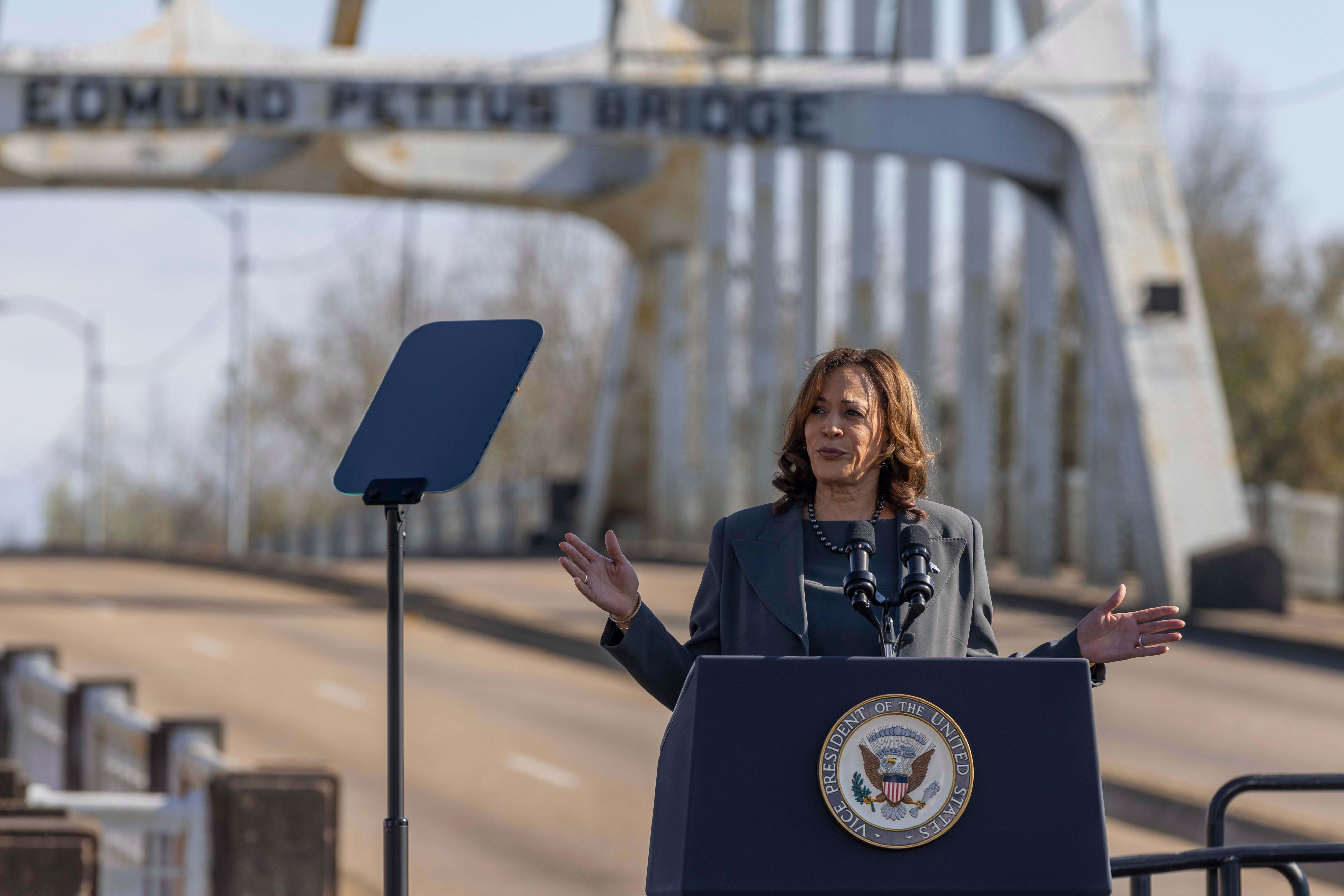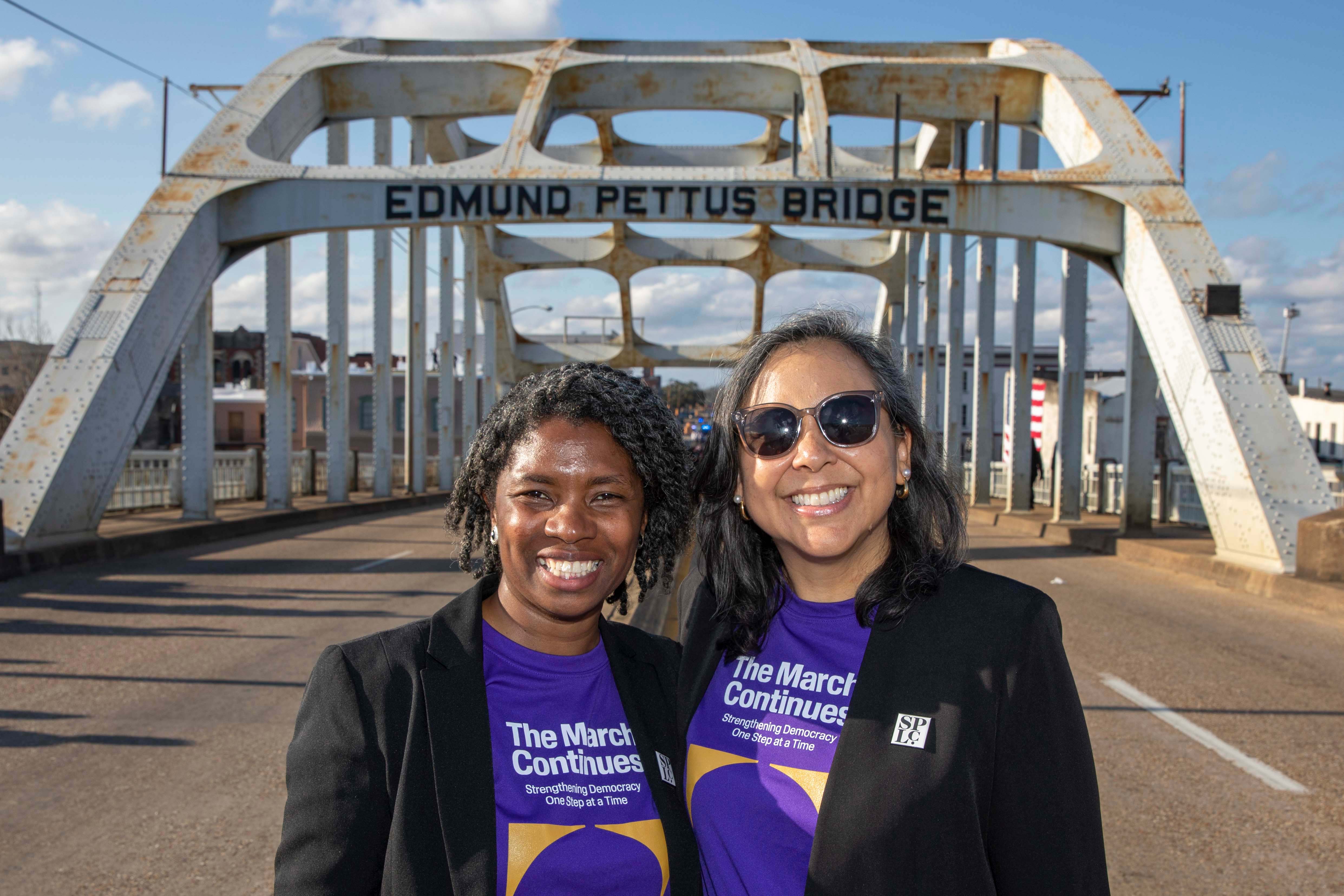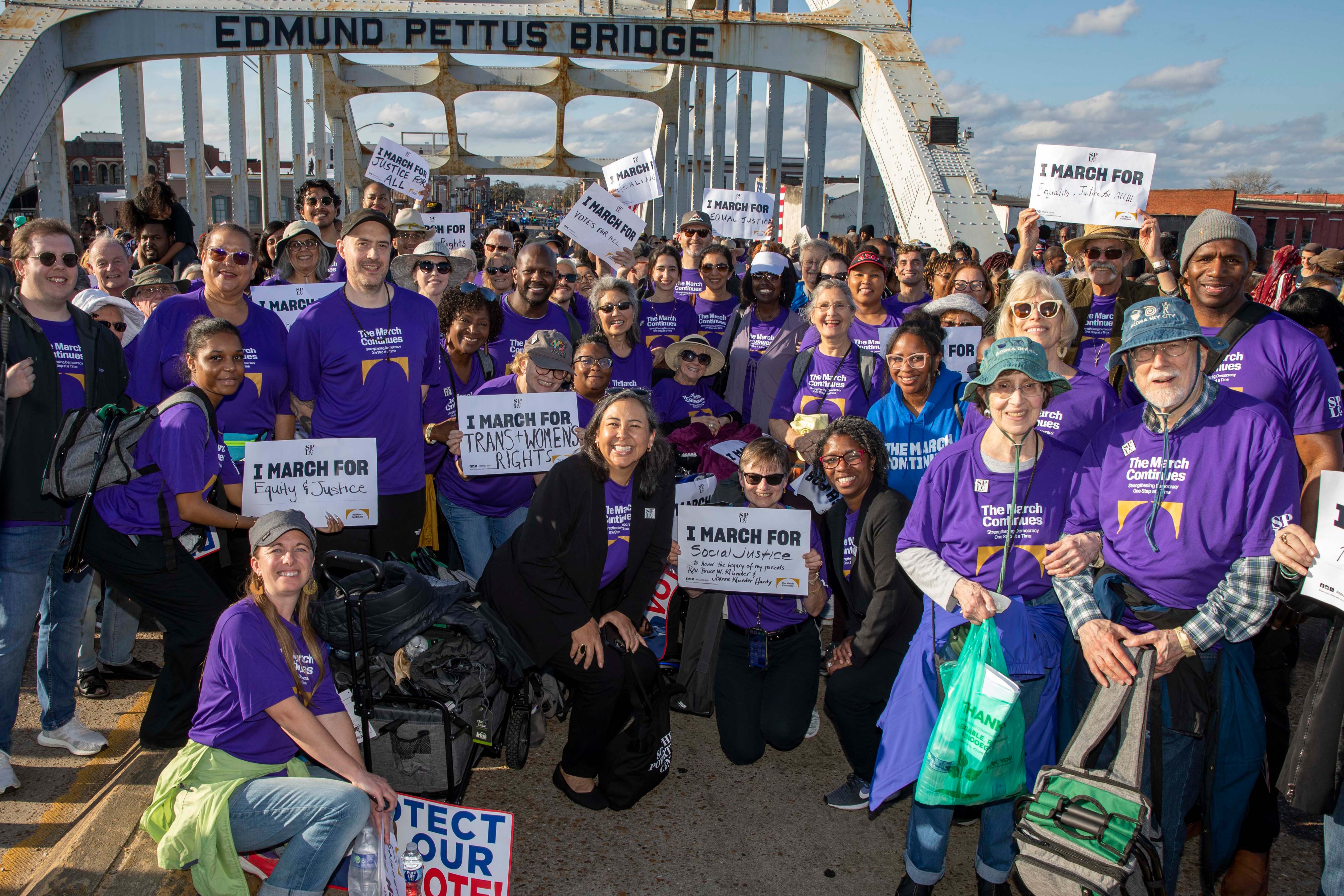Annual Selma Bridge Crossing Jubilee highlights progress and continuing battles
It was a good day to be in Selma, even if the misting rain kept people away until the afternoon sun broke through.
But while the gray clouds threatened before they were vanquished, the smell of barbecue competed with the low throb of bass powering old R&B classics along Water Avenue to draw people out for the 59th Anniversary Selma Bridge Crossing Jubilee. The weeklong event, commemorating the March 7, 1965, attack on 600 voting rights marchers, culminated March 3 with a speech from Vice President Kamala Harris before she led thousands on a march across the over the Alabama River.
Harris broke some news on the international front, and more delivery of aid to the war-stricken territory.
âWhat we are seeing every day in Gaza is devastating,â she said. âWe have seen reports of families eating leaves or animal feed. Women giving birth to malnourished babies with little or no medical care, and children dying from malnutrition and dehydration.â
The focus of the speech, however, remained solidly on the continuing struggle for fair and equal elections, the same cause that drove the march from Selma to Montgomery almost six decades ago.
âWe know our fight for freedom is not over because, in this moment, we are witnessing a full-on attack on hard-fought, hard-won freedoms, starting with the freedom that unlocks all others: the freedom to vote,â Harris said. âThe sacred freedom to vote.â
Southern Poverty Law Center President and CEO Margaret Huang, who led the ĂŰĚŇ´ŤĂ˝âs delegation at the bridge crossing, said that remembering the history is important while remaining soberly aware that the threats to voting rights are with us still.
In the video: Scenes from the crossing of the Edmund Pettus Bridge closing out this yearâs Jubilee on March 3, 2024, in Selma, Alabama.
âToday, we mark the 59th anniversary of the Selma-to-Montgomery March,â Huang said. âA march that brought much progress, but sadly a journey that is not finished. Unfortunately, we are seeing once again a rise in voter suppression, which seeks to discourage communities of color from participating in our great democracy.â
The march across the bridge and the surrounding events honored the past but acknowledged the very real, current threats to voter rights. Nonviolence training sessions began last week, but alongside the presentations on voter registration and voter mobilization were groups focused on helping families rebuild their community after years of economic decline that has dogged the largely rural Black Belt region.
Economic struggles
This yearâs events preceded the 59th anniversary of , when marchers were brutally beaten by white state troopers and sheriffâs deputies, some on horseback, as they tried to cross the bridge on a march to the state Capitol in Montgomery to demand voting rights for Black people.
The violence on Bloody Sunday, rather than silencing the movement, poured gasoline on the sparks of change. Thousands of activists poured into Selma to join the campaign, culminating in a 54-mile march to the steps of the Alabama Capitol 18 days later and the enactment of the Voting Rights Act the following August.
Now, almost seven decades later, the grandchildren of those foot soldiers who powered that movement are seeing the rights their grandparents won rolled back not only in the Deep South but on a national level, as state lawmakers enact strict voting regulations and implement gerrymandered election district maps.
But for many in Selma today, the struggle is not only for voting rights but day-to-day survival. On March 2, the ĂŰĚŇ´ŤĂ˝âs Alabama State Office staff presented a discussion on growing the economy in Selma, especially in the wake of the tornado that tore through the town last year.
âEconomic revitalization is the catalyst for helping small rural towns like Selma recover after natural disasters,â said Tafeni English-Relf, director of the ĂŰĚŇ´ŤĂ˝âs Alabama state office. âHowever, it takes public and private investments. The Alabama Avenue project, which is the focus of Saturdayâs workshop, is the first block in a phased project over the next seven to 10 years. We are coming together to spur business development, repair public works infrastructure and develop plans to create new businesses and jobs to revitalize Selma.â
The program â titled âRestoring Hope: Igniting Selmaâs Economic Development One Block at a Timeâ â featured panelists from the ĂŰĚŇ´ŤĂ˝ and Torin Brazzle, who founded , a nonprofit dedicated to enhancing economic opportunities for minority communities. The program focused on a planned, street-by-street approach to redeveloping Selmaâs infrastructure and economy.
âUnfortunately, economic disparities exist, and poverty is still one of the greatest obstacles afflicting communities of color,â said Huang. âThat is why our session was focused on economic development. We need policies that eliminate poverty in the Deep South now. We canât wait. Everyone must have a future which provides opportunities, so that all in our society can thrive.â
Still a âlong journeyâ
By Sunday, March 3, the traditional trappings of the annual commemoration were firmly in place. The commemorative breakfast honoring Martin Luther King Jr. kicked off the morning before participants split up to attend various church services across the city. They reconvened after lunch at for a rally in preparation for the bridge crossing. The church was the starting point for the march on Bloody Sunday and a refuge for injured people after the attack on the bridge.
As the crowd in Selma moved from the rally to the foot of the Edmund Pettus Bridge at Water Avenue, it merged with the large gathering already in place on Broad Street at the foot of the bridge, awaiting remarks from the vice president.
In her remarks prefacing Harrisâ speech, U.S. Rep. Terri Sewell echoed the need for economic renewal across the Black Belt and thanked federal officials for their post-storm efforts in Selma. She also noted that the strength and fortitude of the cityâs residents has been demonstrated time and time again.
âIt was the people of this district who dared to make this nation live up to its highest ideals of equality and justice for all,â Sewell said. âIt was the sacrifice of the people of this district, this hometown of mine, that brought us the Civil Rights Act of 1964 and the Voting Rights Act of 1965.â
Harris said the fight to reestablish the rights granted under the original Voting Rights Act is continuing with the reintroduction of the John R. Lewis Voting Rights Advancement Act, which was introduced in the U.S. Senate last week.
âToday, in states across our nation, extremists pass laws to ban drop boxes, limit early voting, and restrict absentee ballots,â Harris said. âIn Georgia, extremists passed a law to even make it illegal to give people food and water for standing in line to exercise their civic duty and right to vote. I ask the friends here: Whatever happened to âlove thy neighborâ? The hypocrisy abounds.â
She also touched on the paradox that Alabamaâs conservative Supreme Court entered the in vitro fertilization (IVF) debate last week in a ruling that resulted in the suspension of fertility treatments in the state.
âHere in Alabama, they attack the freedom to use IVF treatment,â Harris said. âWomen and couples denied the ability to fulfill their dream of having a child. And consider the irony. On the one hand, these extremists tell women they do not have the freedom to end an unwanted pregnancy. And on the other hand, these extremists tell women they do not have the freedom to start a family. Let us agree: One does not have to abandon their faith or deeply held beliefs to agree the government should not be telling her what to do with her body.â
As the vice president completed her speech and prepared to lead the gathered marchers across the bridge, the crowd along Broad Street began organizing into groups, each marching unit representing a different church, civil rights group or family. Along with Harris at the head of the procession were several surviving foot soldiers from the original march, leading the way across the bridge once again.
âThat is why we are here today again, on this bridge, to march, to remind us that we still have a long journey to travel,â said Huang. âOne that requires us to demand that our democracy be preserved, for now and future generations, and that everyoneâs right to vote is secure.â
Photo at top: Jubilee participants cross the Edmund Pettus Bridge in Selma, Alabama, on March 3, 2024, to mark the 59th anniversary of Bloody Sunday. (Credit: Alyssa Pointer)




